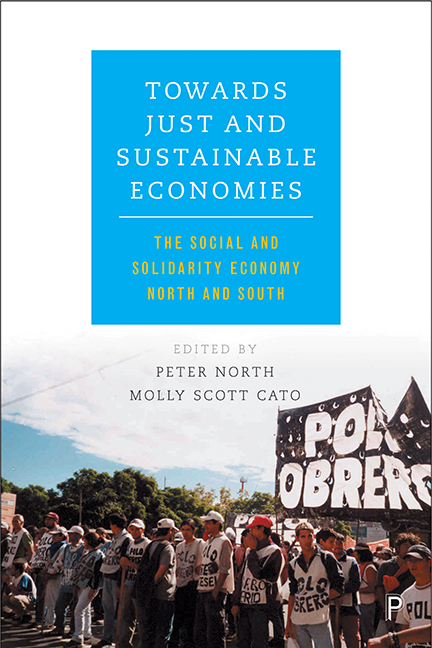Book contents
- Frontmatter
- Dedication
- Contents
- List of figures and tables
- Notes on contributors
- Acknowledgements
- One Introduction: new economies North and South – sharing the transition to a just and sustainable future
- Part I Theoretical perspectives on the social and solidarity economy
- Part II The social and solidarity economy as a site of social innovation
- Part III The social and solidarity economy and the state
- Part IV Policy translation between North and South
- Index
Three - Monsieur le Capital and Madame la Terre on the brink
Published online by Cambridge University Press: 05 April 2022
- Frontmatter
- Dedication
- Contents
- List of figures and tables
- Notes on contributors
- Acknowledgements
- One Introduction: new economies North and South – sharing the transition to a just and sustainable future
- Part I Theoretical perspectives on the social and solidarity economy
- Part II The social and solidarity economy as a site of social innovation
- Part III The social and solidarity economy and the state
- Part IV Policy translation between North and South
- Index
Summary
It is an enchanted, perverted, topsy-turvy world, in which Monsieur le Capital and Madame la Terre do their ghostwalking as social characters and at the same time directly as things. (Capital, Vol III [Marx, 1967, p 830])
Introduction
The political weight of global capital, particularly finance capital and its reactionary side-kick, landed capital, can be measured by the new cities it has built in the global South where none existed before, by the rapidity with which it abandons emblematic zones of prosperity in the global North, and by the ferocity with which it destroys habitats, species and clean air everywhere. On the other side of the global ghost-walk by Monsieur le Capital and Madame la Terre, those marginalised and menaced by globalisation as well as those opposed to it in principle have been putting down the roots of social and solidarity enterprises (SSEs) in the thin soil of opposition, thereby asserting the existence of alternative ways of living in today's world. How do we assess these efforts and claims? Are they big enough? What is big? What is enough? In short, if we look to SSEs to challenge the hegemony of capital, how do we expect them to do this?
According to Marx's analysis, the Achilles heel of capital's hegemony is its successful mystification of how land and labour are commodified in the course of capitalist economic growth. One illustration of this idea will suffice. Marx in his discussion of the transformation of agriculture in Scotland wrote about the actions of a certain Duchess of Sutherland with respect to the communal lands adjoining her estates. He explained:
From 1814 to 1820, all 15,000 inhabitants, about 3,000 families, were systematically hunted and rooted out. All their villages were destroyed and burnt, all their fields turned into pasturage. British soldiers enforced this eviction and thus this fine lady appropriated 794,000 acres of land that from time immemorial belonged to the clan. (Marx, 1887, p 682)
Violence, Marx argued, is the essential first step in the commodification of land and labour. Obscuring that violence is essential to defending capitalism; obscuring violence requires narratives that mystify how it comes to pass that people's lives are a plaything of market forces.
- Type
- Chapter
- Information
- Towards Just and Sustainable EconomiesThe Social and Solidarity Economy North and South, pp. 37 - 56Publisher: Bristol University PressPrint publication year: 2017

